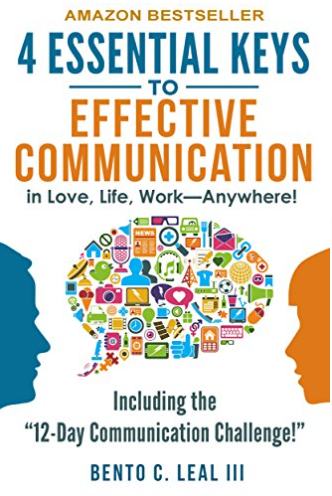Bento C. Leal III’s book, “4 Essential Keys to Effective Communication in Love, Life, Work–Anywhere!: A How-To Guide for Practicing the Empathic Listening, Speaking, and Dialogue Skills to Achieve Relationship Success,” serves as an invaluable manual for enhancing communication skills across all areas of life. With a focus on empathic listening, clear speaking, and constructive dialogue, Leal offers readers the tools to improve their relationships, career, and personal satisfaction. This comprehensive guide is designed for anyone looking to foster deeper connections and navigate conversations with more grace and effectiveness.
Key Features
- Empathic Listening: Leal places a strong emphasis on the power of listening with empathy. He explains how this skill is fundamental to understanding others and building trust, providing readers with practical exercises to enhance their listening abilities.
- Clear Speaking: The book outlines strategies for expressing oneself clearly and assertively without causing offense or misunderstanding. Leal’s tips for speaking aim to ensure that one’s message is heard and comprehended accurately.
- Constructive Dialogue: Recognizing the importance of back-and-forth conversation, Leal teaches readers how to engage in dialogue that is constructive, rather than confrontational, leading to more productive and satisfying interactions.
- Application Across Contexts: One of the most compelling aspects of the book is its applicability in various contexts—be it at home, in romantic relationships, at work, or in social settings. Leal provides specific examples and scenarios that help readers apply these skills in different aspects of their lives.

Connection to Counseling and Healing
Leal’s “4 Essential Keys to Effective Communication” is not just a guide to talking and listening better; it’s a roadmap to emotional and relational healing. The skills outlined in the book are fundamental to the counseling process, both for counselors and those seeking therapy. By practicing empathic listening and engaging in effective dialogue, individuals can bridge gaps in understanding, resolve conflicts, and deepen their connections with others.
The book offers counselors and therapists a set of tools that can be incorporated into their practice to help clients improve their communication skills. This is particularly valuable in relationship counseling, where breakdowns in communication often lie at the heart of issues.
Moreover, Leal’s emphasis on empathy and understanding aligns with the therapeutic goals of healing and growth. By fostering better communication, individuals can improve their relationships, self-awareness, and emotional well-being.

